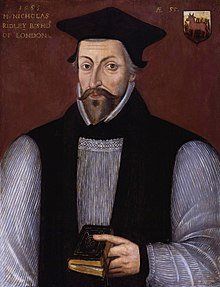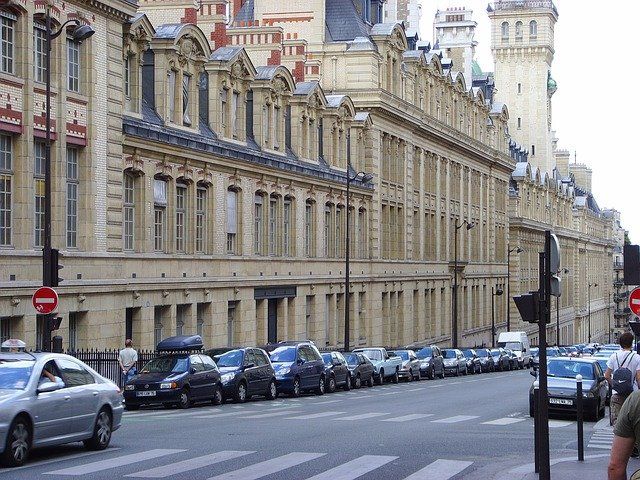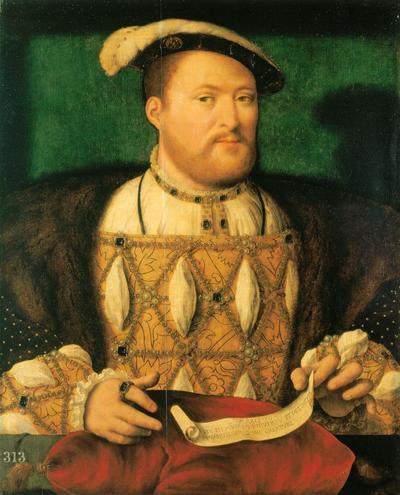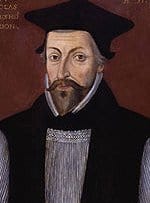
Along with Cranmer and Latimer, Nicholas Ridley was one of the three principal figures of the English Reformation. It is thought that he was born 500 years ago, in 1500, which is why we are remembering him this year.
Some consider him to be the leading thinker of the English Reformers. At his trial in Oxford, the Bishop of Gloucester exhorted him to turn, saying: ‘For what a weak and feeble stay in religion is this, I pray you? Latimer leaneth to Cranmer, and Cranmer leaneth to Ridley, and Ridley to the singularity of his own wit’.
But Ridley humbly denied this to be the case, and said that at the time he was a young scholar in comparison with Cranmer, who was a great doctor of the church. However, it does seem that Ridley was the first to read a treatise by Bertramus entitled De Corpore et Sanguine Domini (published around 840).
This was a treatise on the Lord’s Supper and expressed the view that the consecrated bread was not changed in deed but in figure. It came into Ridley’s hands about 1545 and persuaded him (1) that such views were held in the church in earlier periods, and (2) that those who held them were not excommunicated for doing so.
He came to entertain grave doubts about the truth of the Romish doctrine of transubstantiation, and communicated his doubts to Cranmer. They both came to the conclusion that transubstantiation was un-scriptural, novel and erroneous. But before we go more fully into these matters, let us consider the character of this man.

Distinguished
He was born of northern stock, the second son of Christopher Ridley of Unthank Hall, near Willimotiswick, Northumberland, a descendant of an ancient border family. The region was a wild and lawless place when Ridley was a child, and was repeatedly raided by the Scots from across the border.
In his farewell from prison, before his martyrdom, he recalled the depredations of those border raids. Sometimes a man would lose his life trying to defend his neighbour. So now, said Ridley, he was ready to suffer death to try to protect the church of God; for those who robbed the church were much more crafty and deceitful than the thieves upon the border. The raiders sought only to spoil men of earthly goods, but these seek to rob men of ‘heavenly treasure, true faith, true charity, and hope of salvation in the blood of our Saviour Jesus Christ’.
Ridley left the north when he was about eighteen years of age to enter Pembroke Hall, Cambridge, where he distinguished himself for learning and became a Fellow. Soon after, he went to study at the Sorbonne in Paris.
These were years of normal academic pursuits and retirement from the world, but in 1537 Ridley was drawn out of this retreat. Cranmer, who was Archbishop of Canterbury, invited him to be his chaplain. The fact that Cranmer did this, shows that Ridley had already accepted the Protestant policy, even though he had not yet come to fully-fledged Protestant views. Ridley rejected the crucial doctrines of Rome only gradually.
Reformation doctrines

Although Henry VIII had thrown off the supremacy of the pope, he introduced Six Articles to establish his Catholic credentials. They included transubstantiation, communion in one kind only, the celibacy of priests, vows of chastity and widowhood, private masses, and auricular confession.
Although Ridley preached against these articles, he still accepted the corporal presence of Christ in the sacrament, and regarded auricular confession as permissible. He was, however, becoming increasingly alienated from Catholic dogma, and just before Henry died he finally renounced the doctrine of transubstantiation.
The accession of Edward VI in 1547 gave the Reformers the opportunity they needed to spread their teachings openly, and Ridley took a full part in this development. He was sent with others to the northern province to preach the doctrines of the Reformation.
Soon afterwards, he was ordained Bishop of Rochester. The Reformation in England now began to gather momentum with the compilation of the first English Prayer Book in 1549, in which Ridley played a significant part. This book replaced the mass with a communion service.
Altars removed
However, some like Bishop Gardiner still maintained that they could read into the new service the doctrines of the mass. To remove the ground entirely from such ‘miss-takers’, a further revision of the Prayer Book was undertaken and published in 1552. In this revision, every detail fastened upon by Gardiner as a loophole for the mass was altered.
That was the high-water mark of the Reformation in the Church of England. Today’s abandonment of the Prayer Book in the Church of England, and the substitution of new services, many of which return to the ambiguities of the 1549 Prayer Book, represent an attempt to reinstate the mass in the Church of England.
In 1555 Ridley was installed as Bishop of London. Here he took a bold step forward for the Reformation and ordered the removal of all altars from the churches in his diocese.
‘The form of a table’, he declared, ‘shall move the simple [people] from the superstitious opinions of the Popish mass unto the right use of the Lord’s Supper. For the use of an altar is to make sacrifice upon it; the use of a table is to serve for men to eat upon. Now when we come to the Lord’s board, what do we come for? To sacrifice Christ up again, or to feed upon him, that was once crucified and offered up for us?’
Many of the clergy and people were shocked by Ridley’s action, which they considered sacrilege, but when he had finished his visitation not one altar remained in any church in the diocese of London.
Images
According to Foxe, Ridley also published a treatise against the worship of images, addressed to the king and based on the words of the commandment, ‘Thou shalt not make to thyself any graven image’.
Images were widely used in the churches at the time, but Ridley argued that they were forbidden by the Word of God. He maintained that this prohibition is a moral not a ceremonial commandment and thus valid for all time.
The Scriptures nowhere command idols or images, but everywhere condemn them. To employ them in worship is ‘spiritual fornication’ and, as a good magistrate seeks to banish whoredom, so ought all images to be removed from churches.
He cites the authority of many of the Church Fathers for this and concludes: ‘Experience has shown that if images exist and stand in the church, preaching, writing, decrees and punishments do not prevail against them. For these blind and dull schoolmasters (which they call laymen’s books) have prevailed more than the written books and preaching’.
Arrest and imprisonment
In 1552, after holding an ordination at Cambridge, he paid a visit on his way back to London, to the Princess Mary at Hunsdon, Hertfordshire. He offered to preach before her next Sunday but Mary peremptorily rejected his offer.
She said she would never listen to any sermons that expounded the ‘new religion’. When Ridley left, he said that he regretted having eaten and drunk in a household where God’s Word was despised.
However, Ridley preached before the young King Edward, early in 1552, on the importance of charity. The King was moved and asked Ridley how he could do something to relieve the poor. After consulting Sir William Cecil, Ridley made a proposal to the King, that his house at Bridewell should be given to the poor, that St Thomas’ Hospital in Southwark should be reopened for the sick, and that he should found another hospital, St Bartholomew’s in Smithfield. All these projects were eventually carried out, but only after the King’s death.
By the time these proposals were made, the young King was seriously ill and near to death. On Sunday 9 July 1553, just after the King’s death, but before it was publicly announced, Ridley preached at Paul’s Cross and warned the people of the danger they would be in if Queen Mary were to reign.
An attempt to place Lady Jane Grey on the throne failed to win popular support, with the result that Mary’s claim grew stronger and eventually prevailed. When this happened, Ridley made his way to the camp of Mary, at Framlingham in Suffolk, and made his loyal submission. But he was arrested and committed to the Tower.



